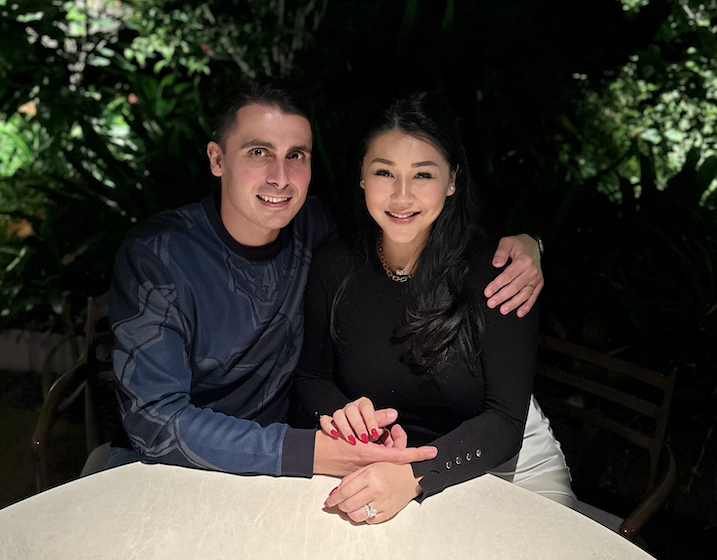
‘In my early 30s, we discovered that I had a low egg count. I would have liked to have been able to freeze my eggs but it was unavailable to women in Singapore then. After this last round of IVF, we have decided that this is it. If it’s unsuccessful, we know that we have given it our all and it is enough.’
Celine Tan-Mordvincev, mum of one, and partner at communications firm, The Ate Group and her husband Alexander Mordvincev, coach to the Singapore National Swim Team, have been on an IVF journey trying for their second child for over a year. Here Celine talks candidly about wanting to freeze her eggs when she was younger, but not being able to do so due the the law back then. Now at 42 and in the early stages of perimenopause, she and her husband are trying for their second child. Celine talks about the importance of a good OB-GYN saying that in many ways, they become your ride-or-die person and she opens up about the challenges of IVF “I am physically and mentally exhausted. I sometimes hate the person I have become because I don’t recognise myself.” As Celine undergoes her last round of IVF, she says they have decided as a family that this is it. “If it’s unsuccessful, we know that we have given it our all and it is enough. We are considered lucky that we have one and we are eternally grateful.” Read on for her full interview.
Read more: Guide to IVF in Singapore: IVF Costs & Success Rates
Can you share a bit about your journey with IVF? When did you first decide to pursue IVF, and what were some of the factors that influenced your decision?
I am an advocate of empowered women’s healthcare, and have been going for regular checkups with the same OB-GYN since my early 20s. In my early 30s, we discovered that I had a low egg count. I knew I wanted children and had a frank conversation with my doctor about egg freezing. I would really have liked to have been able to freeze my eggs at the time but it was unavailable to women in Singapore then. Egg freezing was illegal until July 2023 when elective egg freezing was made legal for women aged 21 to 37, regardless of marital status.
Because of my low egg reserves, my husband and I decided to try to conceive with the help of minimally invasive procedures before considering IVF. We were lucky with my first pregnancy. It took us a couple of years of preparation, which included sticking to a good diet and leading a healthier lifestyle. I finally conceived through IUI and gave birth to our son, Nikolai in 2018 when I was 37.
Five years on from my last pregnancy, I am now 42 and my egg reserves are even lower. Unfortunately, my most recent blood work also revealed that I am in the early stages of perimenopause. Freezing my eggs is not really an option now. I highly encourage women who are younger to consider this if you’re still not ready to have a child.
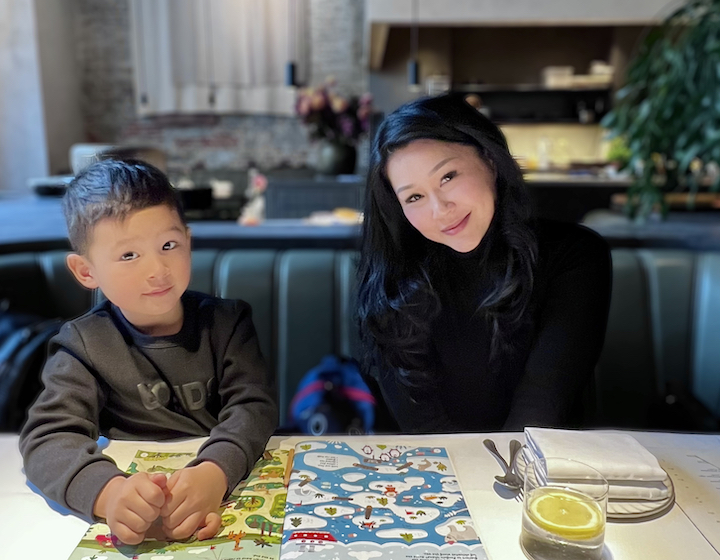
What was the process of finding a fertility doctor like? Any tips for others looking at IVF treatment?
Dr Ann Tan was my original OB-GYN. I had been going to her for over a decade. She and her team were my rock during my first pregnancy.
When she shut her practice, I had to look for another OB-GYN. It was hard to find someone I felt I could connect with. I found it exhausting to consult different doctors just to assess if we clicked. It felt a lot like dating, to be honest, as this person was going to have access to my most intimate details. In many ways, your OB-GYN is your ride or die person, so it’s important to meet him or her, speak to other friends who might be existing patients, and read reviews.
Don’t be afraid to keep searching until you find the one. I also assessed the efficiency of the clinic — whether the doctor would just identify the problem, or actually offer different solutions.
For me, an OB-GYN’s bedside manner is important but not crucial. It’s more important that he or she is compassionate and empathetic. For example, I had one doctor immediately tell me that I should consider adopting because my success rate with IVF was going to be low. While there’s nothing wrong with adoption, it’s disappointing to hear that it’s the first option you are presented with. Needless to say, I did not go to that doctor.
Were there any specific ethical considerations or guidelines that were relevant to your IVF treatment?
Across the border, there are tests for embryos that aren’t available in Singapore. For example, you can go for PGT testing but this isn’t practised in Singapore as part of this process includes selecting the gender of your child.
In my opinion, our medical system views IVF as an assistance to getting pregnant, but ultimately this process needs to be as natural as possible, including leaving the gender of your unborn child to chance.
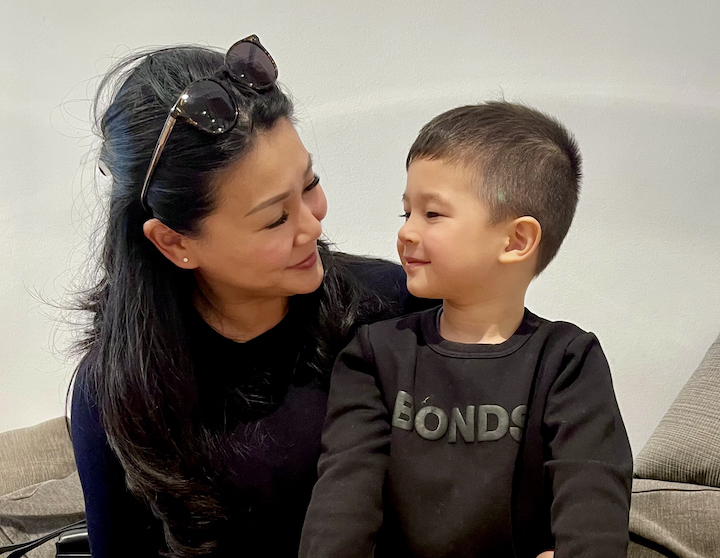
What challenges have you encountered?
Every person has their individual challenges, both mental and physical. It’s been a year since we started our IVF journey and besides the highs and lows of the unknown, I still need to be 100 per cent switched on for work, for my husband, and for my child who is four and highly energetic.
I constantly feel exhausted. I also see the way my body has changed in the past year. I have gained a lot of weight due to the hormonal fluctuations and imbalances. I am physically and mentally exhausted. I sometimes hate the person I have become because I don’t recognise myself. But I am reminded by friends and family that this is okay and I can get back into shape in time to come. But it still bugs me, and it’s a demon that I need to deal with daily.
How are you managing the financial aspects of IVF? Any advice for others?
Singaporeans and PRs can consider government financial assistance. The public hospital programmes are just as good as their private counterparts, but be prepared to wait. If a couple are both Singaporeans, you’re able to get up to 75% of your IVF treatment subsidised. If a couple comprises a Singaporean and a PR, your subsidy is up to 50%; and for a Singaporean and an expatriate, you’re subsidised up to 25%. However, it is important to note that there is a limited number of tries for all subsidies. If you are using Medisave a couple may withdraw $6,000 for the first cycle, $5,000 for the second cycle and $4,000 for the third and subsequent cycles from the patient’s or the patient’s spouse’s MediSave. It is worth doing the research before you begin your IVF journey as policies and grants change all the time.
Read more: Guide to IVF in Singapore: IVF Costs & Success Rates
As a couple, agree on how much you are willing to spend. Set yourself a timeline. There is nothing wrong with putting a stop to things, especially when you have tried your best or if your body needs a break.
Have frank conversations with your doctor. Consider your options regularly, and be open to the unanticipated and unexpected.
I am grateful and blessed that I already have a child, so I cannot begin to fully understand the heartbreak when a childless couple agrees to stop the process a few years into IVF or other procedures. Please understand that YOU are enough, and your partner is enough. In my case, my husband and my son are enough, our current family unit is enough. A new baby is another blessing and a bonus.
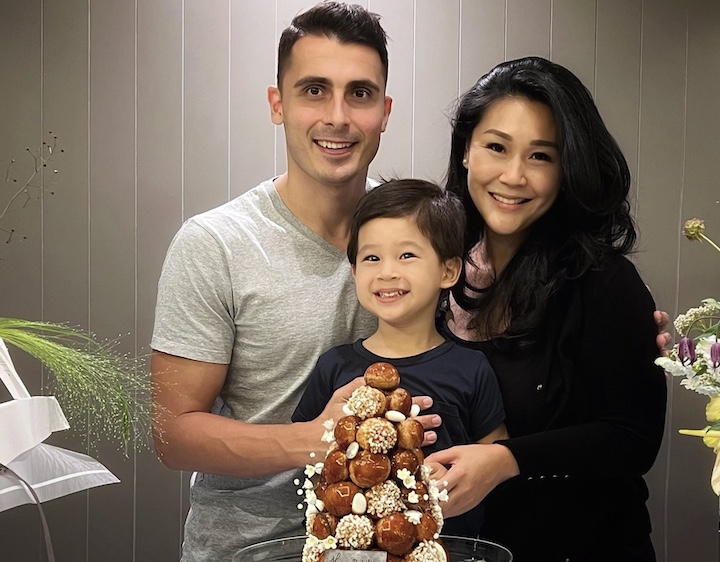
Looking back on your IVF experience, are there any insights you gained that you would like to share with others who are considering IVF?
Do your homework. Will you do it in Singapore, or in another country — possibly where other members of your extended family reside? Meet doctors and research the different facilities.
IVF is not a bad word. Be open and honest with your partner, workplace, friends and other members of your family. You will be surprised at how many people might be going through or have gone through the same process. They will be open and supportive of you.
Women supporting women is key to your emotional state. Your tribe will love you no matter what.
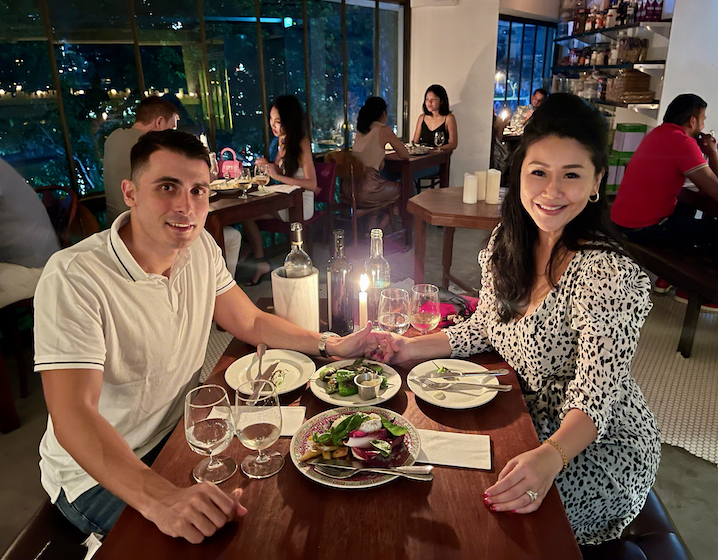
Has your IVF journey been hard on your relationship with your partner? How have you both dealt with this?
To be honest, I am lucky to have quite a hands-on partner. However, I am fiercely independent and it is not my nature to ask for help or expect any. It’s tough on your relationship when you’re on IVF. It’s honestly an emotional rollercoaster.
I have come to realise that women simply need more comfort, patience and understanding during this time, because what we are used to and what we have known our whole lives, has suddenly become foreign — even alien. Your body is no longer your own, your reflection is sometimes unrecognisable. It would be ideal if your partner can step up, help around the house more, be more sensitive and encouraging.
After this last round of IVF, we have decided as a family that this is it. If it’s unsuccessful, we know that we have given it our all and it is enough. We are considered lucky that we have one and we are eternally grateful. We will accept the outcome, move forward and live on with happiness.
Thank you so much for sharing about your IVF journey Celine! We are all thinking of you at team Sassy Mama and wishing you the best.
Fertility Support Groups:
Read more on IVF:


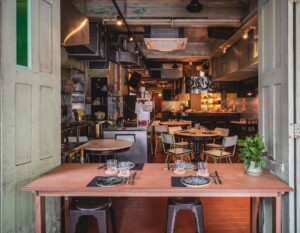



 View All
View All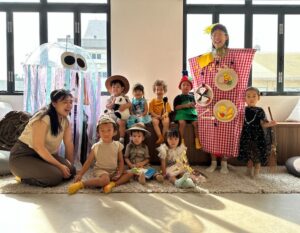
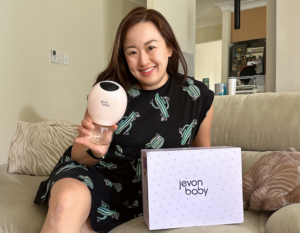

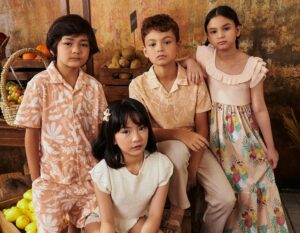

 View All
View All



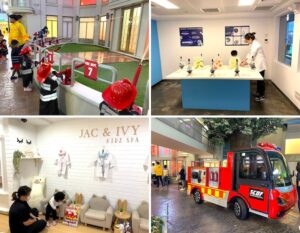





 View All
View All


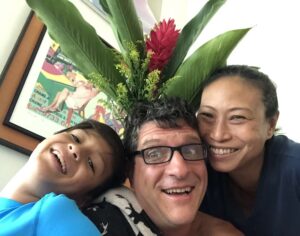
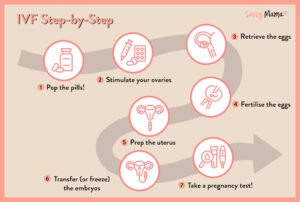
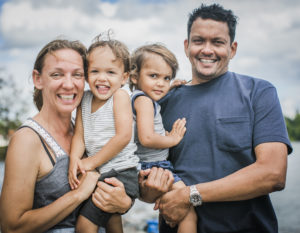
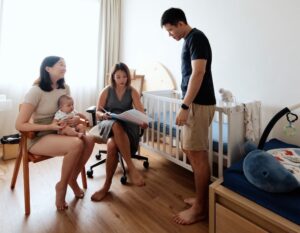
![[𝗙𝗜𝗥𝗦𝗧 𝗟𝗢𝗢𝗞] 𝗞𝗶𝗱𝗭𝗮𝗻𝗶𝗮 𝗥𝗲𝗼𝗽𝗲𝗻𝘀 𝗶𝗻 𝗦𝗲𝗻𝘁𝗼𝘀𝗮!
KidZania finally reopens (click our link in bio for 50% perk deets). Look out for exciting interactive learning experiences for kids of all ages. Kids will get to participate in role-playing activities and get hands-on with various jobs. From fighting a fire to being a policeman, becoming a doctor or a courier deliveryman, kids will get to step into the world of an adult for a unique educational experience. They will even get a pre-loaded credit card that they can use to ‘pay’ for some activities, so they will learn how quickly money disappears!
Since this is a highly anticipated attraction, do brace yourself (and the kids!) for the queues within KidZania! Also, some attractions have a minimum height requirement of 1.30m, which is great for older kids (but might result in some tears for disappointed little ones).
.
.
.
.
#kidzaniasg #kidzania #educationalexperiences #sgmummy #sgmums #sgparents #sgmom #sgmummies #sgkids](https://www.sassymamasg.com/wp-content/plugins/instagram-feed/img/placeholder.png)
